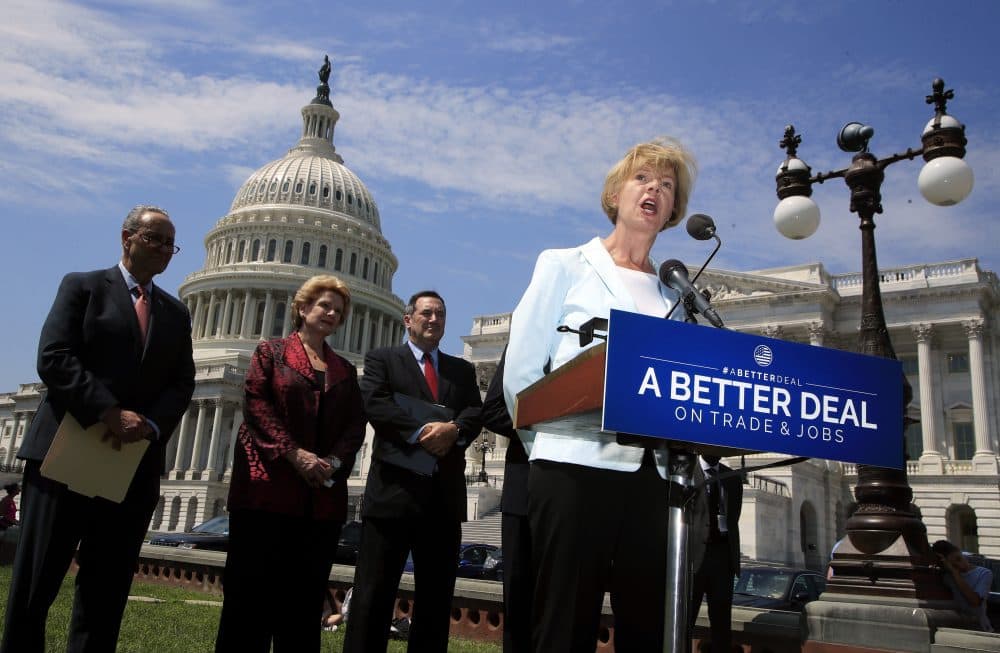Advertisement
Commentary
A Bitter Deal: Why Democrats Must Reverse Their Betrayal Of Abortion Rights Supporters

If you can ignore the fact that the Democratic Party’s just-released 2018 platform echoes the name of an old Papa John’s pizza ad campaign, the “Better Deal” sounds like a promising formula for the next round of elections.
The meat of the deal is economics -- going boldly where Hillary Clinton’s failed presidential campaign trod with caution. Higher wages, better jobs and fairer benefits are just a few of the items that the Democrats plan to pursue in the months ahead. It’s a powerful position to assume at a time when the U.S. government is controlled by Donald Trump and hardline Republican Party leaders whose sympathy for the plight of common Americans — evidenced by the recent Affordable Care Act repeal efforts -- runs roughly the length of a coin.
For Democratic voters who have long been urging party leaders to tack left, the Better Deal may arrive with a whiff of uncertainty. It signals a major gear change for the Democratic Party, which has long treated its leftist activist wing as a nuisance: especially when issues like higher wages and corporate money in politics come up. The voters whom the Better Deal is designed to appease are used to being disappointed by Democratic Party leaders. And sure enough, barely a week after the Better Deal was unveiled, Democratic Congressional Campaign Committee chairman Rep. Ben Lujan found a truly blindsiding way to disappoint liberal voters once again. In an interview with The Hill, Lujan announced that in the interest of not holding candidates to ideological “litmus tests,” the DCCC will no longer withhold funding for Democrats who oppose abortion rights.

In the context of Clinton’s recent run for president — which illuminated reproductive rights as sacred — Lujan’s declaration is shocking. But when one considers the Democratic Party’s behavior during recent election years, it’s not entirely surprising that the DCCC chairman would undermine the party’s new economic platform by throwing women who support abortion rights under the bus. When faced with political problems, the Democrats have a bad habit of cutting and running. Take the problematic rollout of the Affordable Care Act in 2013. Rather than defend the long-term efficacies of the law, Democratic leaders and midterm candidates largely distanced themselves from the Obama administration, hoping to score votes from moderate and conservative voters who had been adversely affected by the rollout. It didn’t work. Voters detected the disingenuous stench of the Democrats’ ploy and the party got clobbered in the 2014 midterms.
Today, by adopting a mildly progressive stance on economics while betraying millions of women who support abortion rights — a glaring contradiction, considering that reproductive health is very much an economic issue -- the Democrats are succumbing to reactionary logic once again and setting themselves up for another bloodbath in 2018. An about-face like this practically dares voters who support abortion rights to re-register as independents, considering that these voters have reliably voted blue for decades. The smarter alternative would be to embrace progressive economic policies while continuing to treat reproductive rights as party bedrock. That the Democratic Party has declined to do this suggests that the party intends to win back the House by appealing to centrist and conservative voters once again, even though these demographics are very hard to win and a lot less reliable than liberal and leftist voters who rightly feel taken for granted.
The smarter alternative would be to embrace progressive economic policies while continuing to treat reproductive rights as party bedrock.
When one looks solely at the exit polls from the 2016 elections, in which liberals and leftists lost to the might of conservative voters, it would appear that the Democrats have little choice but to grit their teeth and make some unseemly compromises. But in fact, the electoral map for 2018 and beyond is much vaster and more uncharted than Democratic Party officials seem willing to admit. Even now, more than half a year since the 2016 election, it is not remarked upon nearly enough that almost half of America did not vote last November.
That’s more than 90 million voting-eligible adults.
The women and men who comprise this massive electoral enigma are waiting to be deciphered and won over by any political party. Considering the rise of voter ID laws and other impediments to voting in America — many of which have been constructed by Republican lawmakers and have reduced turnout from likely Democratic voters — it is not a stretch to surmise that many of these non-voters could be persuaded to support a party that decisively identifies as left-of-center. For every pro-labor moderate or conservative voter who can’t stomach the thought of women having control of their own bodies, there is likely at least one non-voter who can.
Why not court them instead?
